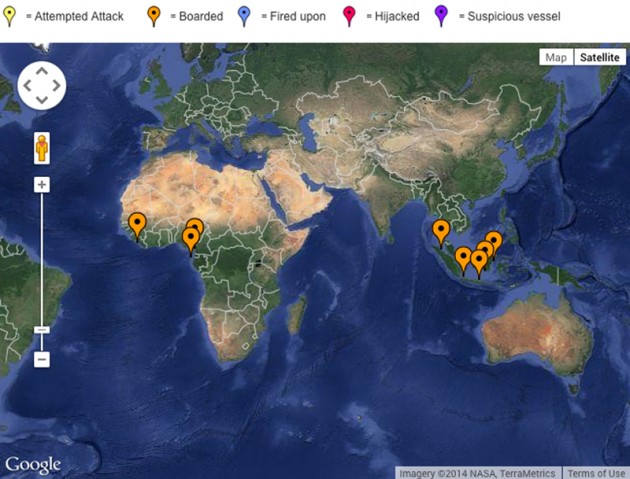'The single biggest reason for the drop in worldwide piracy is the decrease in Somali piracy', says International Maritime Bureau boss
Piracy at sea has reached its lowest levels in six years, with 264
attacks recorded worldwide in 2013, a 40 per cent drop since Somali piracy
peaked in 2011.
There were just 15 incidents
reported off Somalia in 2013, compared to 75 in 2012, and 237 in 2011, the International Chamber of Commerce (ICC)
International Maritime Bureau (IMB) has revealed.
IMB’s annual global piracy report shows more than 300 people were
taken hostage at sea last year and 21 were injured, nearly all with guns
or knives.
A total of 12 vessels were hijacked, 202 were boarded, 22
were fired upon and a further 28 reported attempted attacks. Nigerian
pirates were particularly violent, killing one crewmember, and
kidnapping 36 people to hold onshore for ransom.
‘The single biggest reason for the drop in worldwide piracy is the
decrease in Somali piracy off the coast of East Africa,’ said Pottengal
Mukundan, director of IMB, whose Piracy Reporting Centre (PRC) has
monitored world piracy since 1991.
The use of private armed security teams, the hardening of vessels, international navies and the stabliising influence of Somalia’s central government have all been deterrents for Somali pirates, says IBM in a statement.
Captain Mukundan added: ‘It is imperative to continue combined international efforts to
tackle Somali piracy. Any complacency at this stage could re-kindle
pirate activity.’
The 15 incidents attributed to Somali pirates in 2013 include two
hijacked vessels, both of which were released within a day as a result
of naval actions. A further eight vessels were fired upon. These figures
are the lowest since 2006, when 10 Somali attacks were recorded.
World-wide attacks
Meanwhile, West African piracy made up 19 per cent of attacks worldwide last
year. Nigerian pirates and armed robbers accounted for 31 of the
region’s 51 attacks, taking 49 people hostage and kidnapping 36, more
than in any year since 2008.
Malaysian waters saw the hijacking of two product tankers with 27
crew taken hostage, resulting in the theft of ships’ property and cargo.
Indonesian anchorages and waters saw the most pirate attacks, accounting for more than 50 per cent of all vessels boarded in 2013. IMB reports that the majority of these incidents were ‘low-level opportunistic thefts’ but stated that armed robbery increased for a
fourth consecutive year.
More than a third of Indonesia’s incidents were
reported in the last quarter of 2013. The IMB PRC has been working
closely with the Indonesian Marine Police who have increased maritime
patrols and designated safe anchorage areas for vessels to use in
certain higher risk ports.
Attacks in India and Bangladesh are also described as ‘low-level and
opportunistic’. The incidents off India have increased year on year
since 2010, reaching 14 in 2013, while IMB says active patrolling by the
Bangladesh Coast Guard has kept the number of incidents off Chittagong
in Bangladesh at around 12 for the last few years.
The IMB PRC is the only independent 24-hour manned centre receiving
reports from and providing information to ships, law enforcement and
governments in respect of attacks around the world.
IMB strongly urges
all shipmasters and owners to report all incidents of actual and
attempted piracy and armed robbery to the IMB PRC.
This first step in
the response chain is vital to ensuring that adequate resources are
allocated by authorities to tackle piracy. Transparent statistics from
an independent, non-political, international organization can act as a
catalyst to achieve this goal.




